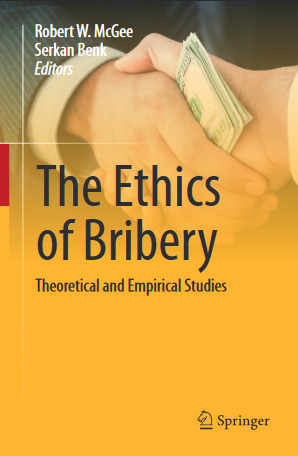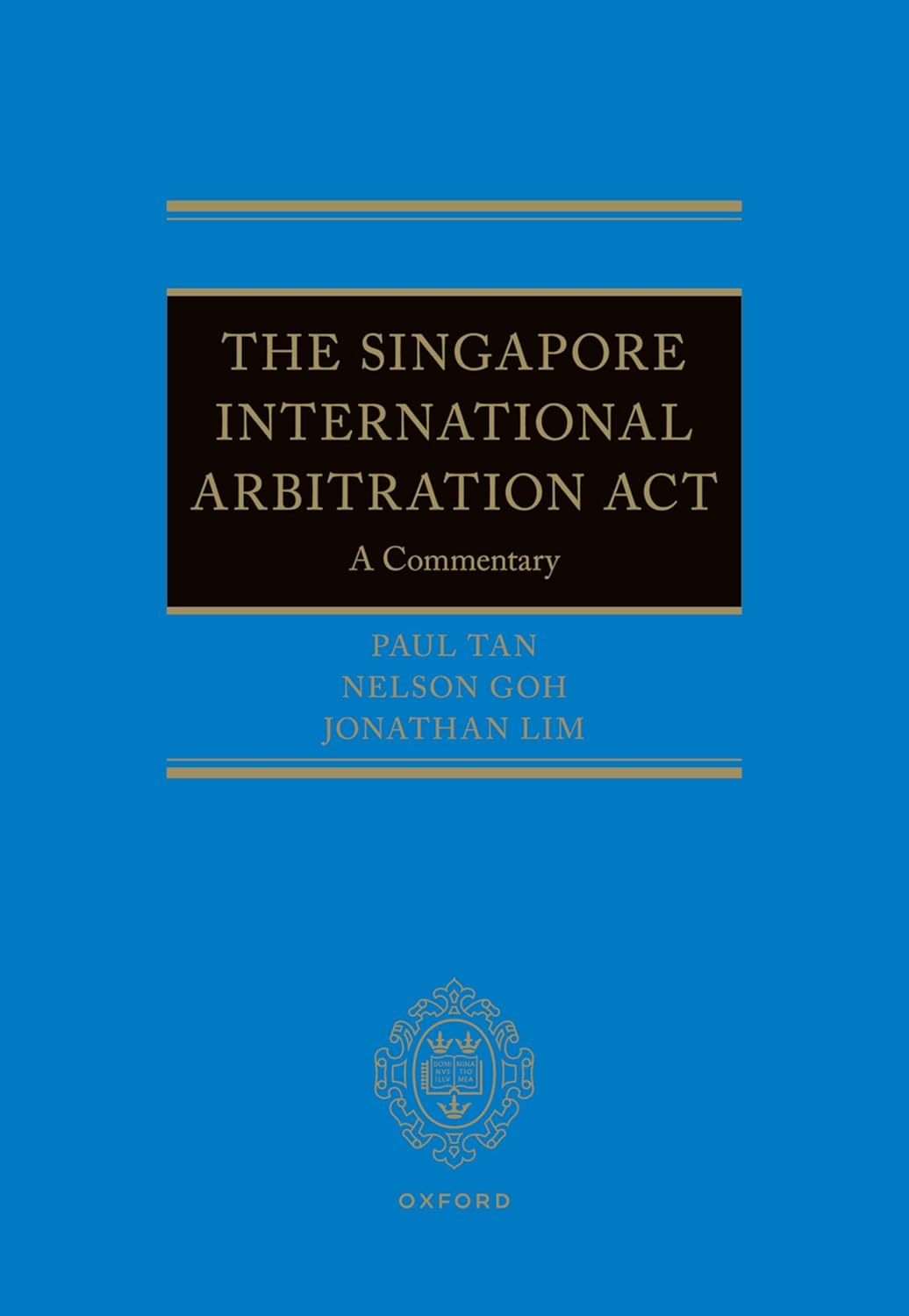11 Chapter 2 Religious Attitudes Toward Bribery: A Comparative Study Robert W. McGee, Serkan Benk, and Bahadır Yüzbaşı Introduction The present study is part of a much larger study that examines the ethics of bribery and tax evasion. The bribery studies consist (so far) of two books (McGee & Benk, 2023; McGee & Benk, 2023a) and many articles and book chapters. Summaries of 28 studies (McGee, 2022a), 24 studies (McGee, 2023a), 44 studies (McGee, 2022b), and 80+ studies (McGee, 2022c) are also available. The tax evasion studies started in 1994 (McGee, 1994) and picked up speed in 1998 when the first book in the tax evasion series was published (McGee, 1998). The second book in the series was published in 2012 (McGee, 2012a). Two more books were recently added to the tax evasion collection (McGee & Shopovski, 2023a, b). Many articles and book chapters on the ethics of tax evasion have been published over the years. Summaries of many of them are available. There are sum- maries of 49 studies that used a survey template that usually consisted of 18 state- ments starting with the phrase, “Tax evasion is ethical if ...” (McGee, 2012b). Another study summarized 23 studies that used World Values Survey data (McGee, 2012c). Other studies summarize 3 studies (McGee, 2012d), 21 studies (McGee, 2022d), 35 studies (McGee, 2022e), 60+ surveys (McGee, 2022f), 70+ theoretical and empirical studies (McGee, 2022g), 100+ studies (McGee, 2022h), 80+ studies (McGee, 2022i), 34+ studies (McGee, 2022j), and 44+ studies (McGee, 2022k). It is often thought that bribery is always unethical (Logue, 2005). Carson (1987) holds a similar view, because bribery involves a breach of duty, although he makes some exceptions in cases where the bribe is for a compassionate reason. R. W. McGee (*) Fayetteville State University, Fayetteville, NC, USA S. Benk · B. Yüzbaşı Inonu University, Malatya, Turkey © The Author(s), under exclusive license to Springer Nature Switzerland AG 2023 R. W. McGee, S. Benk (eds.), The Ethics of Bribery, https://doi.org/10.1007/978-3-031-17707-1_2 12 However, if one thinks about it a little, it is possible to come up with scenarios where bribery might be ethical. A helping-hand bribery (McGee, 2023c; McGee & Block, 2023) can be ethical, as in the case where someone bribes a prison guard to allow a political prisoner to escape or pays a guard to allow a victim of sex traffick- ing to go free. In such cases, the transaction is a mutually beneficial exchange where no one’s rights are violated. Greedy-hand bribery, on the other hand, involves the abuse of power. As such, it is always considered unethical. Using one’s authority to extract cash to perform a service that one is legally obligated to perform anyway is unethical. Let’s take the example of an international trade situation. California farmers want to sell their fruits and vegetables in the South Korean market. Let’s say that South Korean farmers pressure the Korean customs inspectors to wait for 30 days after a shipment from California arrives, which would make the fruits and vegeta- bles unmarketable. If an American who represents the California farmers bribes the customs inspector to inspect the goods immediately instead of waiting 30 days, the number of winners vastly exceed the number of losers. California farmers benefit, as do Korean consumers, who now have lower prices due to increased competition, as well as a larger variety of fruits and vegetables to choose from. The customs inspector benefits. The only real losers are the Korean farmers, who deserve to be punished anyway for violating the rights of Korean consumers to choose with whom they wish to do business. The mainstream position is that bribery is either always unethical or almost always unethical. The arguments for this position are often persuasive. The bribery situation in the latter days of the Ottoman Empire, for example, became out of con- trol (Akdemir & Yeşilyurt, 2023). The corruption and bribe taking that were trig- gered by the COVID-19 pandemic illustrate how a crisis can increase the incidence of corruption practically overnight (Bîzoi & Bîzoi, 2023; Dikmen, & Çiçek, 2023). There are high-tech ways to uncover bribery, but it is difficult to do so (Batrancea et al., 2023). The Foreign Corrupt Practices Act (Trautman & Altenbaumer-Price, 2011, 2013a; Trautman & Kimball, 2018) and the equivalent antibribery legislation in other countries (Trautman & Altenbaumer-Price, 2013b) make many forms of brib- ery illegal. Businesses and individuals are punished for engaging in such activities (Trautman, 2017). However, there is another side to this argument. There is a strain of thought in the philosophical and economic literature that takes the position that only the person who receives the bribe is guilty of unethical conduct (Friday, 2019; Holcombe, 2014; Kinsella, 2011; Lemieux 2005; Rockwell, 1997; Rothbard, 1998; Schweizer, 2013). The people offering the bribe are guiltless and are acting properly. The receiver of the bribe is guilty of breaching the employment contract, or breaching a fiduciary duty, while the person paying the bribe is just paying for the cost of doing business. This Rothbardian (1998) argument has been criticized (Dominiak & Block, 2017). The Block (2018) view is a bit more nuanced. According to this view, the person who pays the bribe is also guilty of unethical conduct because he is aid- ing and abetting the crime perpetrated by the recipient of the bribe. R. W. McGee et al. 13 In cases involving the bribing of a government official, the focus is a bit different because there is no breach of fiduciary, as would be the case where a corporate employee is bribed. The focus here is on whether anyone’s property or other rights are violated. Where rights have been violated, those who violate rights are guilty of unethical conduct. Where no rights have been violated, bribery is not an ethical issue (Block, 2018; Dominiak & Block, 2017; McGee, 2023c; McGee & Block, 2023). The Rothbard-Block Theory of Bribery – Commercial Bribery • Individuals who accept bribes in the course of business are guilty of an uneth- ical act because they are breaching their fiduciary duty to their employer and are violating the firm’s property rights, unless they turn over the proceeds of the bribe to their employer. • According to the Rothbard version of the theory, individuals who pay bribes to company employees are not engaging in unethical conduct because they are not participating in any crime. They are not breaching any fiduciary duty to the company whose employee receives the bribe, and they are not violating the property rights of the company. • According to the Block version of the theory, individuals who pay bribes to company employees are engaging in unethical conduct because they are aid- ing and abetting in the crime that is being perpetrated by the company employee. The Rothbard-Block Theory of Bribery – Bribing Government Officials • Government officials who receive a bribe are guilty of unethical conduct if they are abusing their power, or if doing so violates anyone’s rights. • Government officials who receive a bribe are not guilty of unethical conduct if they disobey a law that is unjust, do not abuse their power, and do not vio- late any property or other right. • Those who bribe government officials are guilty of an unethical act if the bribe results in the use of gov
چکیده فارسی
11 فصل 2 نگرش مذهبی نسبت به رشوه: مطالعه تطبیقی رابرت دبلیو مک گی، سرکان بنک و بهادیر یوزباشی مقدمه مطالعه حاضر بخشی از یک مطالعه بسیار بزرگتر است که به بررسی اخلاق رشوه خواری و فرار مالیاتی می پردازد. مطالعات رشوه (تاکنون) از دو کتاب (مک گی و بنک، 2023؛ مک گی و بنک، 2023 الف) و بسیاری از مقالات و فصل های کتاب تشکیل شده است. خلاصهای از 28 مطالعه (McGee, 2022a)، 24 مطالعه (McGee, 2023a)، 44 مطالعه (McGee, 2022b) و 80+ مطالعه (McGee, 2022c) نیز موجود است. مطالعات فرار مالیاتی در سال 1994 آغاز شد (مک گی، 1994) و در سال 1998 با انتشار اولین کتاب از مجموعه فرار مالیاتی (مک گی، 1998) سرعت گرفت. دومین کتاب از این مجموعه در سال 2012 منتشر شد (McGee, 2012a). اخیراً دو کتاب دیگر به مجموعه فرار مالیاتی اضافه شده است (McGee & Shopovski, 2023a, b). مقالات و فصول کتاب های زیادی در مورد اخلاق فرار مالیاتی در طول سال ها منتشر شده است. خلاصه بسیاری از آنها در دسترس است. خلاصهای از 49 مطالعه وجود دارد که از یک الگوی نظرسنجی استفاده میکردند که معمولاً شامل 18 بیانیه بود که با عبارت "فرار مالیاتی اخلاقی است اگر ..." شروع میشد (مک گی، 2012 ب). مطالعه دیگری 23 مطالعه را خلاصه کرد که از داده های بررسی ارزش های جهانی استفاده کردند (McGee, 2012c). سایر مطالعات 3 مطالعه (McGee, 2012d)، 21 مطالعه (McGee, 2022d)، 35 مطالعه (McGee, 2022e)، 60+ نظرسنجی (McGee, 2022f)، 70+ مطالعه نظری و تجربی (McGe+200) را خلاصه می کنند. مطالعات (McGee، 2022h)، 80+ مطالعه (McGee، 2022i)، 34+ مطالعه (McGee، 2022j)، و 44+ مطالعه (McGee، 2022k). اغلب تصور می شود که رشوه دادن همیشه غیراخلاقی است (لوگ، 2005). کارسون (1987) نیز دیدگاه مشابهی دارد، زیرا رشوه مستلزم نقض وظیفه است، اگرچه او در مواردی که رشوه به دلیل دلسوزانه است، استثناهایی قائل است. R. W. McGee (*) Fayetteville State University, Fayetteville, NC, USA S. Benk · B. Yüzbaşı Inonu University, Malatya, Turkey © نویسنده(ها)، تحت مجوز انحصاری Springer Nature Switzerland AG 2023 R. W. McGee, S. Benk ( eds.), The Ethics of Bribery, https://doi.org/10.1007/978-3-031-17707-1_2 12 با این حال، اگر کمی در مورد آن فکر کنیم، می توان سناریوهایی را در نظر گرفت که در آن رشوه ممکن است اخلاقی باشد رشوه خواری (McGee, 2023c; McGee & Block, 2023) می تواند اخلاقی باشد، مانند موردی که فردی به نگهبان زندان رشوه می دهد تا به یک زندانی سیاسی اجازه فرار دهد یا به نگهبان پول می دهد تا به قربانی قاچاق جنسی اجازه دهد. آزاد شدن در چنین مواردی، معامله یک مبادله سودمند متقابل است که در آن حقوق کسی نقض نمی شود. از سوی دیگر، رشوه خواری با دست حریص، شامل سوء استفاده از قدرت می شود. به این ترتیب، همیشه غیراخلاقی تلقی می شود. استفاده از اختیار فرد برای استخراج پول نقد برای انجام خدماتی که به هر حال قانوناً موظف به انجام آن است، غیراخلاقی است. بیایید یک وضعیت تجارت بین المللی را مثال بزنیم. کشاورزان کالیفرنیا می خواهند میوه ها و سبزیجات خود را در بازار کره جنوبی بفروشند. بیایید بگوییم که کشاورزان کره جنوبی بازرسان گمرک کره را تحت فشار قرار می دهند تا پس از رسیدن محموله ای از کالیفرنیا، 30 روز منتظر بمانند، که باعث می شود میوه ها و سبزیجات به بازار نرسد. اگر یک آمریکایی که نماینده کشاورزان کالیفرنیا است به بازرس گمرک رشوه دهد تا به جای 30 روز صبر کردن، کالاها را فورا بازرسی کند، تعداد برندگان بسیار بیشتر از تعداد بازندگان است. کشاورزان کالیفرنیا و مصرف کنندگان کره ای سود می برند که اکنون به دلیل افزایش رقابت قیمت های پایین تری دارند و همچنین تنوع بیشتری از میوه ها و سبزیجات برای انتخاب دارند. بازرس گمرک سود می برد. تنها بازنده واقعی کشاورزان کرهای هستند که به دلیل نقض حقوق مصرفکنندگان کرهای برای انتخاب با کسی که میخواهند تجارت کنند، مستحق مجازات هستند. موضع اصلی این است که رشوه یا همیشه غیراخلاقی است یا تقریباً همیشه غیراخلاقی است. استدلال های این موضع اغلب قانع کننده است. برای مثال، وضعیت رشوه در روزهای آخر امپراتوری عثمانی، از کنترل خارج شد (Akdemir & Yeşilyurt، 2023). فساد و رشوهگیری که توسط همهگیری کووید-19 آغاز شد، نشان میدهد که چگونه یک بحران میتواند وقوع فساد را عملاً یک شبه افزایش دهد (بیزوی و بیزوی، 2023؛ دیکمن، و چیچک، 2023). راههایی با فناوری پیشرفته برای کشف رشوه وجود دارد، اما انجام این کار دشوار است (Batrancea et al., 2023). قانون اقدامات فساد خارجی (Trautman & Altenbaumer-Price, 2011, 2013a; Trautman & Kimball, 2018) و قوانین مشابه ضد رشوه در سایر کشورها (Trautman & Altenbaumer-Price, 2013b) بسیاری از اشکال رشوه را غیرقانونی می کند. مشاغل و افراد به دلیل درگیر شدن در چنین فعالیت هایی مجازات می شوند (Trautman, 2017). با این حال، این استدلال جنبه دیگری نیز دارد. در ادبیات فلسفی و اقتصادی نوعی تفکر وجود دارد که این موضع را اتخاذ می کند که تنها فردی که رشوه دریافت می کند مرتکب رفتار غیراخلاقی است (جمعه، 2019؛ هولکام، 2014؛ کینزلا، 2011؛ لمیو، 2005؛ راکول، 1997؛ راثبارد. ، 1998؛ شوایزر، 2013). افرادی که رشوه می دهند بی گناه هستند و به درستی عمل می کنند. دریافت کننده رشوه به دلیل نقض قرارداد کار یا نقض وظیفه امانتی مجرم است، در حالی که شخص رشوه دهنده صرفاً هزینه تجارت را پرداخت می کند. این استدلال روتباردیان (1998) مورد انتقاد قرار گرفته است (Dominiak & Block, 2017). نمای Block (2018) کمی ظریفتر است. بر اساس این دیدگاه، شخصی که رشوه می دهد، مرتکب رفتار غیراخلاقی نیز می شود، زیرا در جرمی که توسط گیرنده رشوه مرتکب شده است، کمک و مشارکت می کند. R. W. McGee و همکاران 13 در مواردی که به رشوه دادن به یک مقام دولتی مربوط می شود، تمرکز کمی متفاوت است زیرا هیچ گونه نقض امانتداری وجود ندارد، همانطور که در مورد رشوه دادن به یک کارمند شرکتی وجود دارد. در اینجا تمرکز بر این است که آیا دارایی یا سایر حقوق کسی نقض شده است یا خیر. در جایی که حقوق نقض شده است، کسانی که حقوق را نقض می کنند، مرتکب رفتار غیراخلاقی هستند. در جایی که هیچ حقوقی نقض نشده است، رشوه دادن یک موضوع اخلاقی نیست (Block, 2018؛ Dominiak & Block, 2017؛ McGee, 2023c؛ McGee & Block, 2023). نظریه روثبارد بلوک رشوه - رشوه تجاری • افرادی که در جریان تجارت رشوه می گیرند مرتکب یک عمل غیراخلاقی می شوند زیرا وظیفه امانتداری خود را در قبال کارفرما نقض می کنند و حقوق مالکیت شرکت را نقض می کنند، مگر اینکه آنها را تحویل دهند. درآمد حاصل از رشوه به کارفرمای خود. • طبق نسخه روتبارد از نظریه، افرادی که به کارکنان شرکت رشوه می پردازند، به دلیل اینکه در هیچ جنایتی شرکت نمی کنند، مرتکب رفتار غیراخلاقی نمی شوند. آنها هیچ گونه وظیفه امانتداری را در قبال شرکتی که کارمند آن رشوه دریافت می کند نقض نمی کنند و حقوق مالکیت شرکت را نقض نمی کنند. • بر اساس نسخه بلوک این نظریه، افرادی که به کارکنان شرکت رشوه می پردازند، دست به رفتار غیراخلاقی می زنند، زیرا در جنایتی که توسط کارمند شرکت انجام می شود، کمک و مشارکت می کنند. نظریه راثبارد بلوک رشوه - رشوه دادن به مقامات دولتی • مقامات دولتی که رشوه دریافت می کنند، اگر از قدرت خود سوء استفاده کنند، یا اگر این کار حقوق هر کسی را نقض کند، مرتکب رفتار غیراخلاقی خواهند شد. • مقامات دولتی که رشوه دریافت می کنند، اگر از قانون ناعادلانه سرپیچی کنند، از قدرت خود سوء استفاده نکنند و هیچ دارایی یا حق دیگری را نقض نکنند، مرتکب رفتار غیراخلاقی نیستند. • کسانی که به مقامات دولتی رشوه می دهند، در صورتی که رشوه منجر به استفاده از دولت شود، مرتکب یک عمل غیراخلاقی خواهند شد
ادامه ...
بستن ...
ISBN 978-3-031-17706-4 ISBN 978-3-031-17707-1 (eBook)
https://doi.org/10.1007/978-3-031-17707-1
© The Editor(s) (if applicable) and The Author(s), under exclusive license to Springer Nature
Switzerland AG 2023
This work is subject to copyright. All rights are solely and exclusively licensed by the Publisher, whether
the whole or part of the material is concerned, specifically the rights of translation, reprinting, reuse of
illustrations, recitation, broadcasting, reproduction on microfilms or in any other physical way, and
transmission or information storage and retrieval, electronic adaptation, computer software, or by similar
or dissimilar methodology now known or hereafter developed.
The use of general descriptive names, registered names, trademarks, service marks, etc. in this publication
does not imply, even in the absence of a specific statement, that such names are exempt from the relevant
protective laws and regulations and therefore free for general use.
The publisher, the authors, and the editors are safe to assume that the advice and information in this book
are believed to be true and accurate at the date of publication. Neither the publisher nor the authors or the
editors give a warranty, expressed or implied, with respect to the material contained herein or for any
errors or omissions that may have been made. The publisher remains neutral with regard to jurisdictional
claims in published maps and institutional affiliations.
This Springer imprint is published by the registered company Springer Nature Switzerland AG
The registered company address is: Gewerbestrasse 11, 6330 Cham, Switzerlan
ادامه ...
بستن ...










